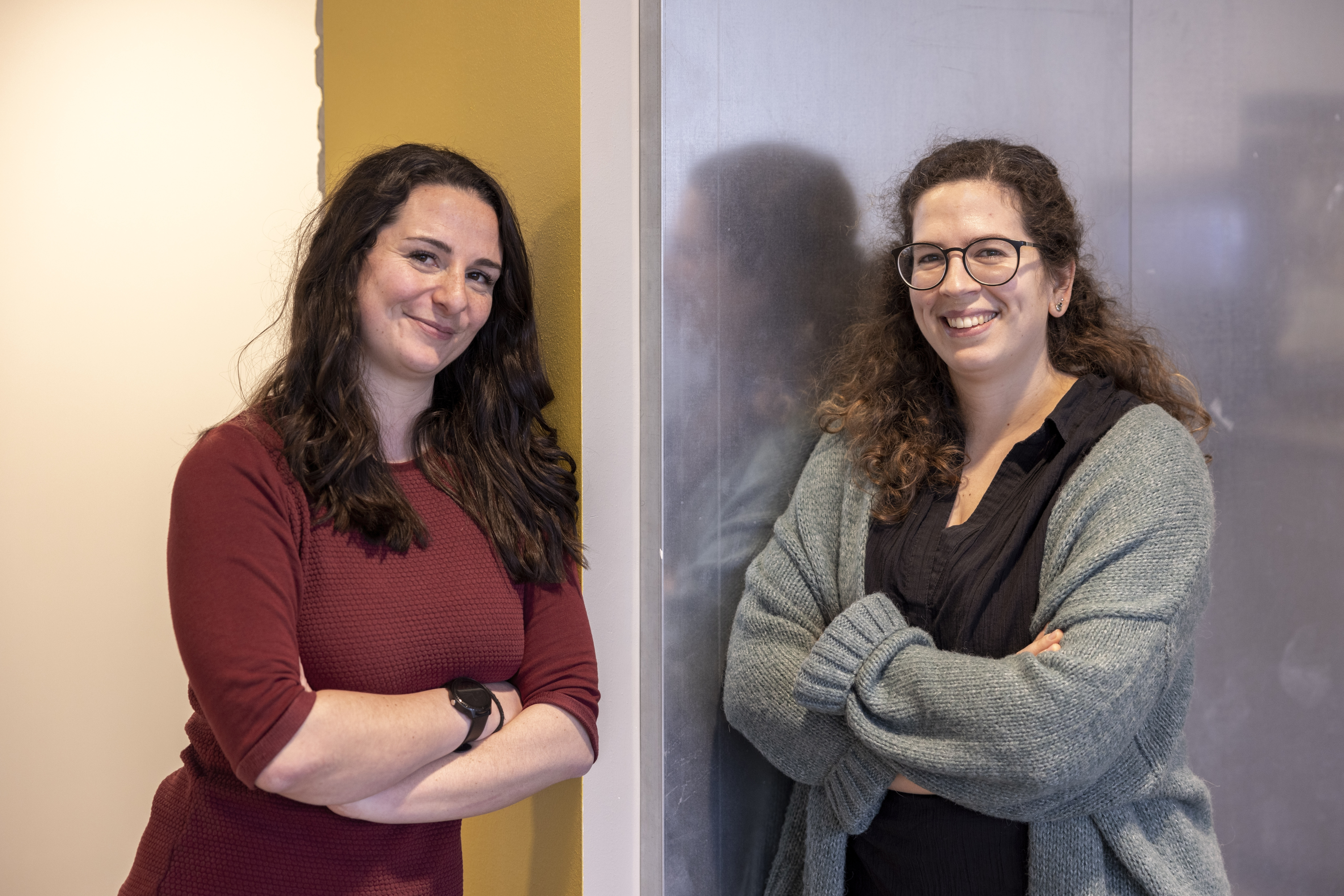CID unites: Jana Runze and Irene Pappa
‘The science that we practice is not black and white’
Text: Peter de Jong
Photos: Bob Bronshoff
For those who did not already know: the research world is international. As is the CID. It brought PhD student Jana Runze from Germany and postdoc Irene Pappa from Greece together; they are doing important research together on the effect of genes on human behaviour. They talk about it enthusiastically, in fluent Dutch.
What does your research entail exactly?
Irene: ‘We study how genes play a role in how parents and children interact. This can be done in many ways. For example, based on a large number of genes, we calculated three genetic scores for parents: for IQ, income, and education.
If a mother has a high genetic score for IQ, this means she possesses a combination of genes that are characteristic of people with a high IQ – although it does not automatically mean she has a high intelligence. We saw that the higher the parents scored on IQ, income, and education, the better they recognised signals from the child and then responded appropriately.’
Jana: ‘In addition, we looked at whether such a connection also existed the other way round. So, whether those same genetic scores, but in the children, showed a correlation with their mother’s adequate response. This was, indeed, the case. It may be that the child’s genes influence the parents’ behaviour, rather than just the other way around.’

Does that mean that if both child and mother have a high genetic score on those three aspects, the child will be more successful in later life?
Irene: ‘No, it does not. We quantify the average effect of heritability on certain behaviour and do so in a large group of people. We always talk about statistical odds. How someone ultimately develops is and remains a complex interplay of heredity and environment.’
Jana: ‘Just look at children’s school performance. Children who learn easily may have inherited that trait from their parents. But if there is no reading or discussion at home, or if the environment shows little appreciation for their learning abilities, they are less likely to perform well at school. The science that we practice is not black and white. We are putting a piece in the big puzzle of how nature and nurture together determine child development.’
How do you know that certain genes are important for intelligence, income, and education?
Irene: ‘Because a lot of research has been done on large groups of people, on both their traits and their genes. You can then compare and combine the two. Ultimately, a particular gene combination is assigned a value associated with, for example, intelligence, income, and education, as well as traits such as obesity or depression. Such correlations are always quite small, because other factors may play a role as well, for example, the effect of environment, parents, neighbourhood, and school.’
‘The science that we practice is not black and white. We are putting a piece in the big puzzle of how nature and nurture together determine child development.’
How did you set up your research?
Jana: ‘In the Generation R study, we have a group of about 1,500 people around Rotterdam; in the future, the Leiden participants of L-CID will be added. These are parents and children whose genetic values we have measured. We did behavioural research on them: we then looked at how child and parent reacted to each other – both in their homes and in a lab at the university. We were not present ourselves but studied the video afterwards. This allowed interactions to be as spontaneous as possible.
For example, we let the parents and children play games that required them to work together, like building a tower. In another task, a child had to sort beads, while the parent was allowed to watch a fun movie, which we knew the child would also like to see. The parent’s job was to nevertheless motivate the child to keep sorting the beads.’
Does a child growing up in a bad neighbourhood with problematic parents have a chance at making it to university?
Irene: ‘Yes, they certainly can. Young children depend mainly on what their environment has to offer – especially their parents. Older children can determine their environment much more for themselves, for example through hobbies and friends. On top of that, someone who likes and easily learns new things is more likely to seek out new challenges and new environments.’
What value does genetic research have for the behavioural sciences?
Jana: ‘Pinpointing the causes of behaviour is very complex. Child development is an intricated interplay between genes and environment. We already know a lot about the effect of the environment. If a child does not meet expectations based on his or her aptitude, it is good to look at their environment. Are there problems at home, or are things not going well at school? The more genetic knowledge we have, the more we find out about how important it is to change something about their environment.’
Irene Pappa (1985) studied biology and medicine in Athens. In 2011, she came to Rotterdam for a PhD at Generation R and a specialisation in psychiatry. Now she works three days a week as a child psychiatrist and two days as a postdoctoral researcher at L-CID in Leiden. In her spare time, Irene plays basketball and supports undocumented migrants.
Jana Runze (1992) studied psychology at the University of Twente and behavioural sciences at Radboud University Nijmegen. This summer, she will receive her PhD from VU University Amsterdam, partly on her research within L-CID and the collaboration with Generation R. Jana plays volleyball, runs, and is committed to helping street dogs.
This article is part of a New Scientist special issue about the Consortium on Individual Development, that will appear in September 2023.
